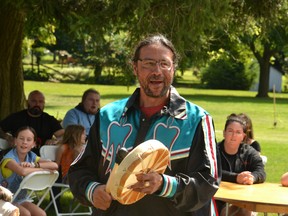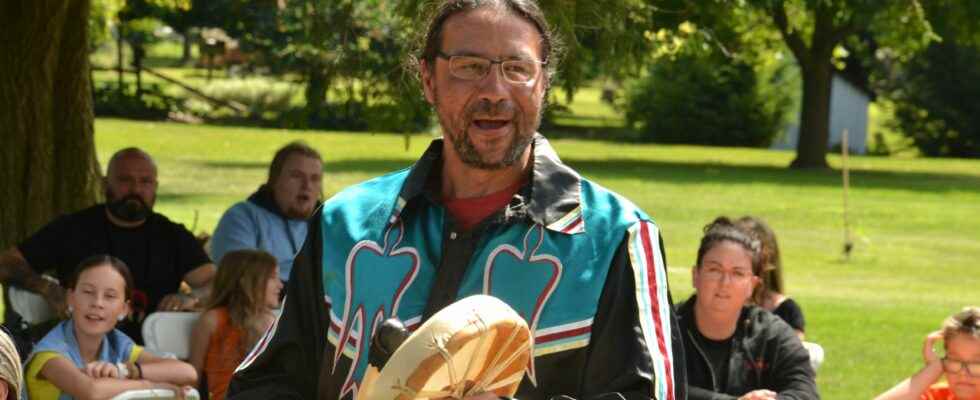To foster a sense of community among Indigenous students and their families, the Avon Maitland District School Board hosted an End of Summer Feast at the Brodhagen Community Center Sunday afternoon.

To help strengthen the community and share Indigenous knowledge, culture and history, First Nation, Metis and Inuit students from across the Avon Maitland District School Board gathered in West Perth Sunday for an End of Summer Feast.
Hosted by the school board, the feast was held at the Brodhagen Community Center and featured Indigenous guest speakers and lunch catered by Stratford’s Howling Moon Catering.
“Today we’re just focusing on creating a sense of community here within Avon Maitland,” said Alicia Park, an Indigenous student support advisor with the school board. “We’re really excited that we’re working toward this opportunity for rebuilding relationships because I think that’s huge, especially when we think about the education system and Indigenous peoples. Trying to foster a better relationship has been a huge part of why we’re here today.
“It’s a first stepping stone and we’re hoping to continue this work for the years to come.”
The event, which was intended to remove any stigma around students self-identifying as Indigenous in schools across the board, is also meant to raise awareness that there are in fact hundreds of Indigenous students and families who are part of school communities across Huron and Perth counties.
“We don’t always know that we’re here,” Park said. “So being able to create that sense of, ‘You are seen, you are heard, and there are people around that are just like you,’ has been a huge part.”
Hired last year, Park, Indigenous student support advisor Melissa Stevens, and lead knowledge keeper Christin Dennis — also one of the feast’s guest speakers — are working with students as part of a board-wide effort to recognize the unique needs of its Indigenous students and impart Indigenous knowledge, culture and history not only on those students, but on students of all races.
“It’s fostering that sharing of knowledge, feeling accepted and building those relationships,” said Stevens. “It’s not even been a year — it seems like a year — but it’s been about building a foundation. So going into the schools, emailing the principals and saying, ‘Hey, I see you have a couple of (Indigenous) identified students in your school, I just want to start a conversation (with them)’ … and just saying, ‘This is my role and I’m here to support you.’ ”
From simply having someone to talk to who understands the Indigenous experience, particularly in a dominantly white school system, to helping Indigenous high school students find information on scholarships and getting their status card, Stevens and Park want Indigenous students to know they and the school board are looking out for them.
And in his role as lead knowledge keeper at the school board, Dennis, a Sixties Scoop survivor who also goes by “Fast Moving Cloud” in Ojibwe, said he’s working to teach all students about Indigenous culture and history at as young an age as possible to foster that care and understanding necessary for a community to thrive.
“My duties as an indigenous person are to go into all the schools and teach different grades,” Dennis said. “The last year we’ve been teaching about the Indigenous horses of North America. Everybody was led to believe there were no Indigenous horses in North America, but when the government was putting Indigenous people on reserves, they would put the horses on reserves. When they started taking the kids off the reserves and putting them in the residential schools, they started shooting the horses. They were calling them a nuisance because we never corralled the horses. The horses were free.”
” … So we actually bring the horses to the schools and we give the kids an opportunity to learn about the horses, which are only … as tall as ponies, but if you look at them from a distance, they look like a full-size horse … but they’re actually the gentlest horses you’ll ever meet.”
In the past year, Dennis has also overseen the inclusion of traditional Medicine Wheels at each school across the board. Because The Medicine Wheel’s colors—red, black, white and yellow—represent what Indigenous people see as the four races, Dennis says his teachings in schools are meant to foster inclusivity and that feeling of belonging among all students.
“So anything that is Indigenous, I’ll try to teach that at a children’s level that they can understand and also feel proud about the culture, not to be devastated by the hardships that we’ve had because, unfortunately, we’ve got something like 600 Indigenous kids in the school board and only 200 of them are self-acknowledged. So there’s another 400 out there that are afraid to self-acknowledge because of the stigma.”
Anishinaabe Algonquin children’s author and fellow Sixties Scoop survivor SP Joseph Lyons also spoke at Sunday’s feast.
“What I decided to do with my own journey was to reach back to the kids that are in foster care now — Indigenous children that are separated from their communities, from their families — and I wrote a series of books for Indigenous children in foster care to give them that hope and understanding that I didn’t have,” Lyons said.
” … The number-one most important thing to Indigenous communities are the communities themselves — all the people around us. And when we live in this colonial world, which is very different, it’s about me, what can I do, what can I achieve on my own, which can often leave you living in a city of millions, still feeling lonely. Whereas in a community … these are your people, your kids, your nieces, nephews, aunts uncles, all of them. They’re your family, they have you, they know you. You belong just because you exist … and the things that you wish to become are all supported and guided by your community.”
And it’s that sense of community and feeling supported and loved by those around you that the Avon Maitland District School Board is trying to foster through events like Sunday’s feast and the ongoing work of people like Dennis, Stevens and Park.
